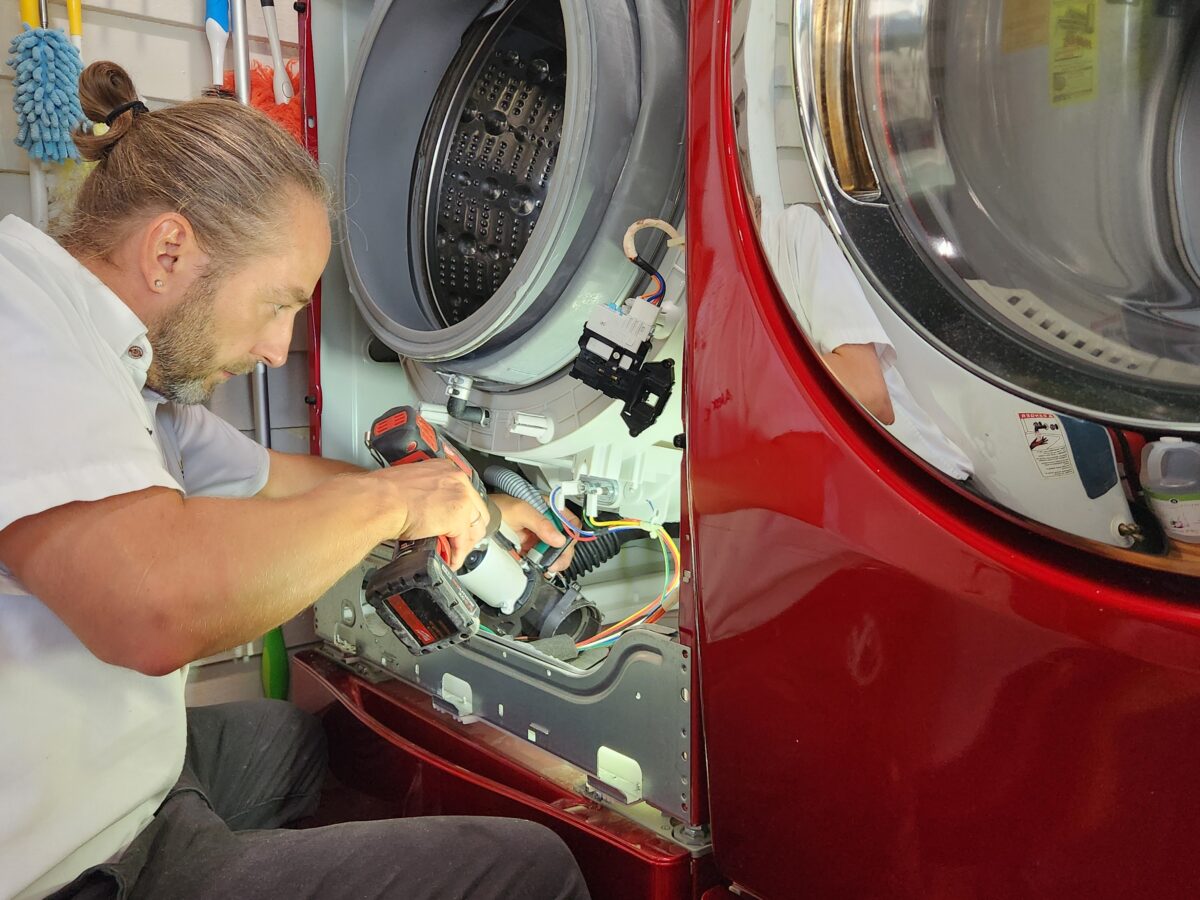Is your washing machine not spinning fast enough? You’re not alone, and it can be really frustrating.
When your clothes come out wetter than they should, it means longer drying times and extra effort for you. But why does this happen? Understanding the reasons behind a slow-spinning washer can save you time, money, and stress. Keep reading to discover the common causes and easy fixes that will get your washing machine spinning at full speed again.
You’ll be surprised how simple some solutions can be!

Credit: smartapplianceservices.com
Common Reasons For Slow Spinning
Slow spinning in washing machines is a common issue that many face. It affects cleaning quality and leaves clothes wetter than usual. Understanding the causes helps fix the problem quickly.
Several factors can slow down the spin cycle. Some are easy to check and repair. Others might need professional help. Below are the most common reasons for slow spinning.
Unbalanced Load
An unbalanced load makes the washer spin slower. Clothes clumped on one side cause the drum to wobble. The machine then reduces speed to prevent damage. Distributing clothes evenly helps maintain fast spinning.
Clogged Drain Pump
A clogged drain pump blocks water flow. This causes the washer to slow during spinning. Small objects or lint often clog the pump. Cleaning it restores normal spin speed and drainage.
Worn Out Drive Belt
The drive belt moves the drum during spinning. A worn or broken belt reduces spin speed. Over time, belts can stretch or tear. Replacing the belt makes the spin cycle faster again.
Faulty Motor Coupling
The motor coupling connects the motor to the transmission. When damaged, it stops the drum from spinning properly. This part wears out with heavy use. Changing the coupling fixes slow spinning issues.
Lid Switch Problems
The lid switch signals the washer to spin. If faulty, the machine may not spin or slow down. This switch stops the washer if the lid is open. Testing and replacing it can restore fast spinning.
Blocked Water Pump
A blocked water pump slows down water removal. Excess water in the drum causes slow spinning. Debris or small objects often block the pump. Clearing the blockage improves spin speed and efficiency.
Damaged Transmission
The transmission controls the drum’s speed and direction. Damage here leads to slow or no spinning. This part handles heavy loads and can wear out. Repairing or replacing the transmission solves slow spin problems.
Signs Of Spinning Issues
Spinning problems in washing machines can affect your laundry results. Recognizing signs of spinning issues helps spot problems early. This avoids bigger repairs and saves time. Below are common signs to watch for.
Excess Water In Clothes
Clothes stay very wet after the spin cycle. The machine does not remove enough water. This means the spin speed is too slow or not working. Wet clothes take longer to dry and may smell bad.
Noisy Operation
The washing machine makes loud sounds during spinning. Strange noises like banging, grinding, or squeaking are clear signs. These sounds show parts may be loose or damaged. Noisy operation can lead to bigger issues if ignored.
Machine Shaking Excessively
The washer shakes or vibrates a lot when spinning. Excessive shaking means the load is unbalanced or the machine parts are worn out. This can damage the machine and reduce spin speed. It also creates noise and movement.
Longer Spin Cycles
The spin cycle takes much longer than usual. A slow spin cycle means the machine struggles to reach high speed. This can happen due to motor problems or sensor errors. Longer cycles waste energy and delay laundry completion.
Quick Fixes To Try At Home
Quick fixes can save time and money. Many washing machine spinning issues are simple to solve. Trying easy steps at home might restore your washer’s speed fast.
These fixes require no special tools. Just basic care and checking common problems. Let’s explore some simple actions to try now.
Redistribute The Laundry
Uneven loads cause slow spinning. Stop the machine and spread clothes evenly. Avoid overloading the washer. Balance helps the drum spin faster and smoother.
Clean The Drain Pump Filter
Clogged filters block water flow. Locate the drain pump filter and remove it carefully. Clean out lint, coins, or debris. A clean filter helps the washer drain well and spin properly.
Replace The Drive Belt
A worn or loose belt slows drum spinning. Check the belt for cracks or damage. Replace it if needed. This part connects the motor to the drum for proper spinning.
Check And Fix The Lid Switch
The lid switch stops spinning if the lid is open. Test the switch by closing and opening the lid. Replace the switch if it does not work. A faulty switch blocks spinning for safety.
Clear Pump Blockages
Blocked pump hoses stop water flow and slow spin. Inspect hoses for clogs or kinks. Remove any blockages carefully. Clear paths let water drain fast and spin speed return.

Credit: www.maytag.com
When To Call A Professional
Knowing when to call a professional for a washing machine that won’t spin fast can save time and money. Some problems need expert care. Attempting repairs without the right skills can cause more damage. A trained technician can diagnose and fix issues safely and quickly.
Persistent Spinning Problems
If your machine keeps spinning slowly despite basic checks, it signals a deeper issue. Constant slow spinning after cleaning filters and checking the load means it’s time for help. Professionals have tools to test parts and find hidden faults.
Electrical Component Issues
Faulty wiring or damaged control boards affect spinning speed. These parts can be dangerous to fix without knowledge. A technician can safely inspect and replace electrical components. This prevents shocks and further malfunctions.
Motor Or Transmission Repairs
The motor and transmission drive the spin cycle. Worn or broken parts here cause slow spinning. These repairs need skill and special tools. Professionals can replace or fix these parts to restore full machine function.
Preventive Measures For Better Spinning
Preventive measures keep your washing machine spinning fast and working well. Small habits help avoid common problems with spinning. These steps save time and money on repairs. Follow simple tips for smooth operation and longer machine life.
Load Clothes Properly
Put clothes evenly inside the drum. Spread items out to balance the load. Avoid clumping heavy and light fabrics together. Proper loading stops the machine from shaking and slowing down. Balanced loads help the spinner work at full speed.
Regular Maintenance Tips
Clean the lint filter often to keep air flowing. Check hoses for leaks or blockages. Remove soap build-up inside the drum with a gentle cleaner. Run an empty cycle with vinegar monthly to clear residue. Regular care prevents parts from wearing out too fast.
Avoid Overloading The Machine
Do not fill the drum beyond its limit. Overloading strains the motor and slows spinning. Heavy loads cause uneven weight distribution. This triggers safety features that reduce spin speed. Follow the user manual’s weight guidelines for best results.

Credit: www.youtube.com
Frequently Asked Questions
Why Is My Washing Machine Not Spinning Fast?
A slow spin can be caused by unbalanced loads, clogged filters, or worn belts inside the machine.
Can A Broken Belt Cause Slow Washing Machine Spin?
Yes, a worn or broken belt can stop the drum from spinning quickly or at all.
Does An Unbalanced Load Affect Washing Machine Spin Speed?
Yes, uneven or heavy loads make the washer slow down or stop spinning to protect itself.
How Does A Clogged Filter Impact Spin Speed?
A dirty or blocked filter restricts water flow, causing the machine to spin slower than usual.
Can Motor Problems Slow Down The Washing Machine Spin?
Yes, motor issues can reduce spin speed or stop spinning completely, needing professional repair.
Conclusion
A washing machine that spins slowly can cause many problems. Common causes include unbalanced loads, clogged filters, or worn-out belts. Fixing these issues can improve your machine’s performance and save energy. Regular cleaning and proper use help prevent slow spinning.
Check your machine often to catch problems early. Small steps make a big difference in washing results. Keep your clothes cleaner and dryer with a fast-spinning washer. Don’t ignore signs of trouble; act soon for best results.
